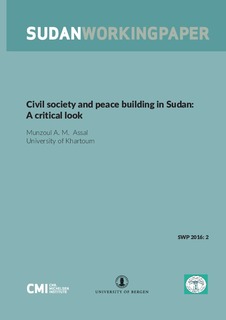| dc.contributor.author | Assal, Munzoul A. M. | |
| dc.date.accessioned | 2018-01-04T08:22:36Z | |
| dc.date.available | 2018-01-04T08:22:36Z | |
| dc.date.issued | 2016-05-01 | |
| dc.identifier | oai:www.cmi.no:5807 | |
| dc.identifier.citation | Bergen: Chr. Michelsen Institute (Sudan Working Paper no. SWP 2016:2) 24 p. | |
| dc.identifier.isbn | 978-82-8062-590-8 | |
| dc.identifier.issn | 1890-5056 | |
| dc.identifier.uri | http://hdl.handle.net/11250/2475336 | |
| dc.description.abstract | Abstract
The role of civil society organizations in peace making and peace building is often valorized, especially in countries that witness protracted conflicts. The assumption underlying this valorization is that while conflicting parties sign peace deals, it is civil society organizations that undertake the implementation of such peace deals. A significant requirement for the success of civil society organizations in peace building is their inclusion in peace making in the first place. Such inclusion is indicative of the recognition accorded to civil society organizations and, conversely, their exclusion means that those who broker peace deals are not cognizant of the roles of these organizations. While civil society organizations may have negative roles or may even be party to conflicts, it is important to highlight the instances in which they are excluded from partaking in peace-making and peace-building engagements. The conceptualization of civil society is yet another challenge that bears on how these organizations contribute to peace making and building. Sudan represents a case that requires scrutiny. The peace process that culminated in signing the Comprehensive Peace Agreement (CPA) in 2005 started in 2002. Peace negotiations spanned over almost three years, with a notable absence of civil society organizations. Peace talks were an exclusive affair between the Sudan Government and Sudan Peoples’ Liberation Army/Movement (SPLA/M). Civil society organizations in Sudan had to deal with the peace agreement as a product of bilateral negotiations between the two signatories, but were keen to contribute to the success of the agreement. Different was the case of the Doha peace talks on Darfur where civil society organizations from Darfur were present during the peace negotiations that culminated in the Doha Peace agreement of 2009.
Taking the examples of Darfur civil society organizations, and two Khartoum-based ones, this research closely looks at | |
| dc.language.iso | eng | |
| dc.publisher | Chr. Michelsen Institute | |
| dc.relation | Sudan Working Paper | |
| dc.relation | SWP 2016:2 | |
| dc.relation.ispartof | Sudan Working Paper | |
| dc.relation.ispartofseries | Sudan Working Paper SWP 2016:2 | |
| dc.relation.uri | https://www.cmi.no/publications/5807-civil-society-and-peace-building-in-sudan | |
| dc.subject | Peace | |
| dc.subject | Society | |
| dc.subject | Organizations | |
| dc.subject | Civil Society | |
| dc.subject | Sudan | |
| dc.title | Civil society and peace building in Sudan: A critical look | |
| dc.type | Working paper | |
